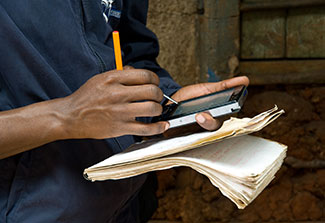
Fogarty awards $4.4 million to advance mobile health
November / December 2018 | Volume 17, Number 6
Awards made through Fogarty's mHealth program support
research related to hardware or software components for
mobile devices to improve health in low-resource settings.
research related to hardware or software components for
mobile devices to improve health in low-resource settings.
Mobile phones, tablets and other wireless devices are increasingly being deployed to improve health in low-resource settings. To help the field advance, Fogarty has awarded $4.4 million in a dozen two-year awards to support mobile health (mHealth) research in low- and middle-income countries.
“By leapfrogging technologies and harnessing the power of mobile devices and applications, we hope to generate an evidence base to guide research, enhance clinical care and improve health outcomes,” said Fogarty Director Dr. Roger I. Glass.
Begun in 2014, the initiative supports research related to hardware or software components for mobile devices. The program’s priority is to support innovative, well-designed multidisciplinary projects that aim to produce generalizable knowledge for the field.
The latest round of funding includes a variety of projects that target a broad range of populations and health problems. For example, one team will use its grant to study the effectiveness of using a telecolposcopy approach to improve cervical cancer diagnoses in Peru. In Uganda, grantees will evaluate a new method of discovering cervical pre-cancer using a low-cost smartphone confocal endoscope, and attempt to provide adequate treatment in a single visit.
Pediatric cancer is the focus of a program in Tanzania that will implement and evaluate an mHealth case management system. In Uganda, researchers will study a digital toolkit to facilitate caregivers’ ability to access basic preventive mental health services for children.
In Pakistan, scientists will target expectant fathers with a speech-based service to connect them with doctors, with the aim of reducing maternal mortality. Current public health outreach efforts are largely directed at women. In Rwanda, a grant will support research on the use of telemedicine to diagnose surgical site infections among rural women following cesarean deliveries. Meanwhile, a Cameroonian team will test the feasibility of using mobile phones as a follow-up tool for trauma patients, to identify those who would benefit from further care, and to better understand the long-term disability and socioeconomic costs of trauma.
In Bangladesh, grantees will study how to scale-up a phone-based program that sends electronic reminders to improve hygiene practices with the goal of reducing pediatric diarrheal disease. Also in Bangladesh, a team will design, build, deploy and study a mobile phone-based application to monitor the progress of children with Autism Spectrum Disorder.
A project in Thailand will investigate how to use mobile solutions to improve drug adherence for populations at risk of HIV. In Zambia, a grant will support research into a medical records application that uses ear morphology as the basis for patient identification.
Finally, in Costa Rica, scientists will work to reduce insect-borne diseases such and dengue, Chagas and Zika by creating a novel, community-driven, GPS-based smart device application. The app will map insect risks, identify and demonstrate community strategies for remediation of insect habitats, and evaluate engagement of local community and tourist populations to help identify risk.
Awards
- Boston University Medical Campus
Project SEARCH (Scanning Ears for Child Health)
Principal Investigators: Drs. Christopher J. Gill and Lawrence Mwananyanda - Duke University
Novel mHealth Technologies to Enhance PrEP Adherence among Thai YMSM: Collaborative Adaption and Evaluation
Principal Investigator: Dr. Sara H. LeGrand - Duke University
mHealth-supported Telecolposcopy for Cervical Cancer Programs in Low-resource Settings
Principal Investigator: Dr. Lavanya Vasudevan - Duke University
An mHealth Case Management System for Reducing Pediatric Cancer Treatment Abandonment
Principal Investigators: Drs. Lavanya Vasudevan and Kristin Schroeder - Harvard Medical School
Telemedicine to Improve the Diagnosis of Surgical Site Infections Post-cesarean Delivery in Rural Rwanda
Principal Investigators: Dr. Bethany Hedt - Johns Hopkins University
WASH mHealth Messages as an Innovative Tool to Facilitate Behavior Change
Principal Investigator: Dr. Christine Marie George - Marquette University
Mobile-Based Care for Children with Autism Spectrum Disorder Using Remote Experience Sampling Method (mCARE)
Principal Investigator: Dr. Sheikh Iqbal Ahamed - New York University School of Medicine
Implementing a Digital Child Mental Health Screening, Literacy, and Management Tool in Faith-Based Settings
Principal Investigators: Drs. Keng-Yen Huang and Janet Nakigudde - University of Arizona
Smartphone Confocal Endoscopy for Detecting Cervical Precancer
Principal Investigator: Dr. Dongkyun Kang - University of California, Davis
Impact Evaluation of Super Abbu: A Speech Based Maternal, Newborn, and Child Health (MNCH) Platform in Pakistan
Principal Investigators: Drs. Arman B Rezaee, Mustafa Naseem and Agha Ali Raza - University of California, San Francisco
A Mobile Phone-Based Triage Tool to Identify Discharged Trauma Patients in Need of Further Care in Cameroon
Principal Investigators: Drs. Catherine Juillard and Alain Mefire Chichom - University of Rochester
mZAP! A Mobile, Community-based GPS Mapping Surveillance Tool Empowering Communities to Alleviate Insect-borne Disease and Ecological Risk in Costa Rica
Principal Investigator: Dr. Timothy De Ver Dye
More Information
To view Adobe PDF files, download current, free accessible plug-ins from Adobe's website .






















.png)









No hay comentarios:
Publicar un comentario